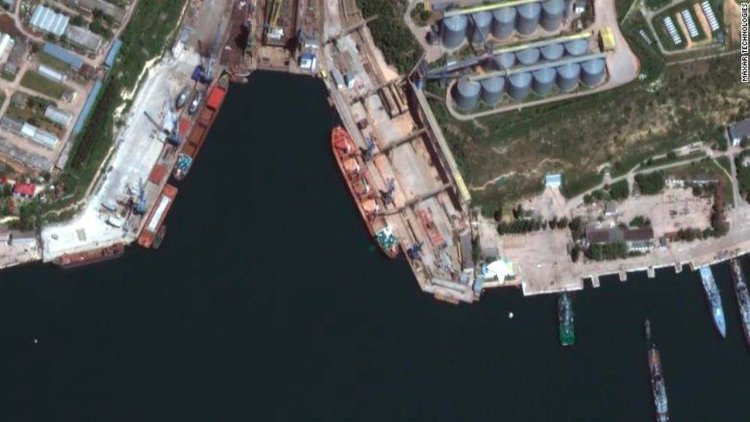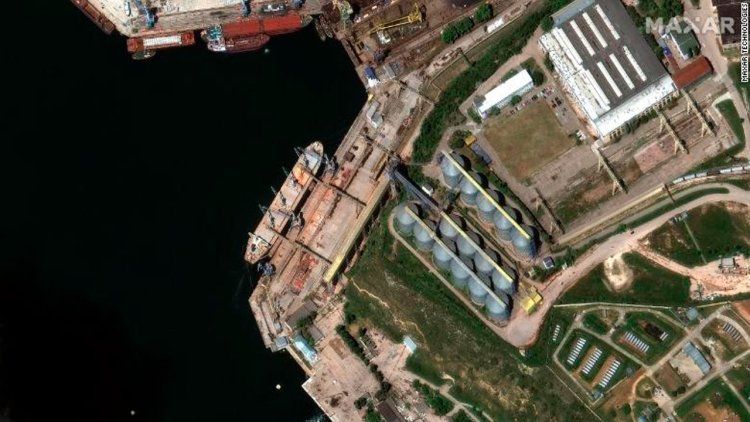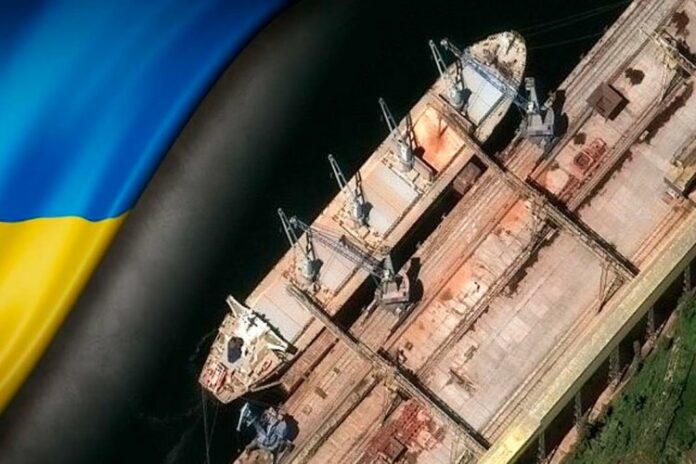Two Russia-flagged bulk carrier ships are shown docking and loading up with what is believed to be stolen Ukrainian grain in the images. Ukraine’s President Volodymyr Zelensky has accused Russia of “gradually stealing” Ukrainian food products and trying to sell them.
The new images from Maxar Technologies, dated May 19 and 21, show the ships — the Matros Pozynich and the Matros Koshka — docked next to what appear to be grain silos with grain pouring off of a belt into an open hold. Both ships have now left the port, according to the ship tracking site MarineTraffic.com, with the Matros Pozynich sailing through the Aegean Sea claiming to be on its way to Beirut and the Matros Koshka still in the Black Sea.
It’s difficult to know for certain whether the ship is being loaded with stolen Ukrainian grain, but Russia-annexed Crimea produces little grain itself, unlike the agriculturally rich Ukrainian regions of Kherson and Zaporizhzhia immediately to the north. Ukrainian officials and industry sources have told CNN that Russian forces in occupied areas have emptied several silos and trucked the grain south.
Earlier this month, the Matros Pozynich carried out a similar mission: loading up with grain and setting sail out of the Black Sea and into the Mediterranean. It was initially bound for Egypt with its cargo, but it was turned away from Alexandria after a warning from Ukrainian officials, according to the country’s government. It was also barred entry to Beirut, eventually docking in Latakia, in Syria, where Russia has for years been propping up the regime of Bashar al-Assad.
At the same time, Russia has been blocking Ukraine from exporting goods from its ports, fueling fears of a global food crisis.

Zelensky said Saturday:
“The world community must help Ukraine unblock seaports, otherwise the energy crisis will be followed by a food crisis and many more countries will face it. Russia has blocked almost all ports and all, so to speak, maritime opportunities to export food — our grain, barley, sunflower and more. A lot of things.”
Before the war, wheat supplies from Russia and Ukraine accounted for almost 30% of global trade, and Ukraine is the world’s fourth-largest exporter of corn and the fifth-largest exporter of wheat, according to the US State Department. The United Nations World Food Program — which helps combat global food insecurity — buys about half of its wheat from Ukraine each year and has warned of dire consequences if Ukrainian ports are not opened up.
The ships have capacities of 30,000 metric tons and earlier this month Ukraine’s Defense Ministry estimated that some 400,000 tons had been stolen and taken out of Ukraine since Russia’s invasion.

Mykola Solsky, Ukraine’s minister of Agrarian Policy and Food, said it is “sent in an organized manner in the direction of Crimea. This is a big business that is supervised by people of the highest level.”
Russia annexed Crimea in 2014, taking with it the key Black Sea port of Sevastopol. Since launching a renewed invasion in February, Russia has deprived Ukraine access to two key ports: capturing Mariupol, on the Sea of Azov, and targeting and blocking Odesa, also on the Black Sea. Ukraine’s inability to export from those ports is not only impacting food levels worldwide but having a devastating impact on the country’s economy.
There are an estimated 22 million tons of grain sitting in Ukrainian silos, US Secretary of State Antony Blinken said last week.
“The Russian Federation claims falsely that the international community’s sanctions are to blame for worsening the global food crisis. Sanctions are not blocking Black Sea ports, trapping ships filled with food, and destroying Ukrainian roads and railways,” Blinken said. “Russia is.”
Source: CNN



